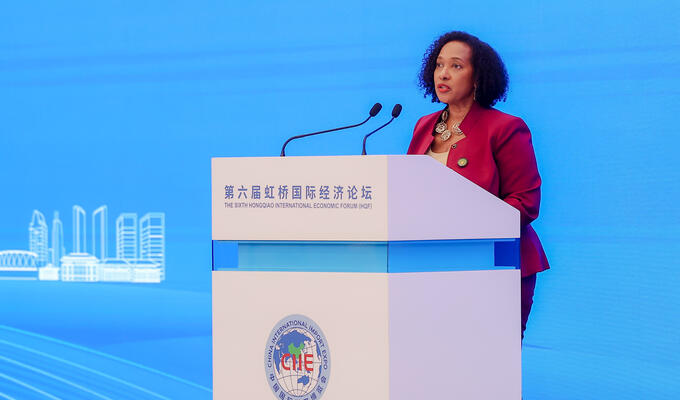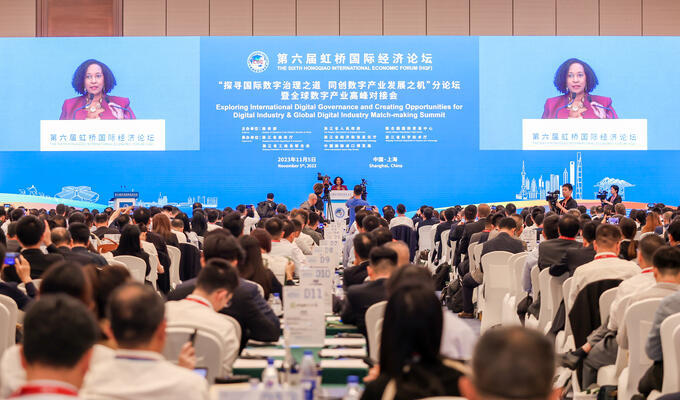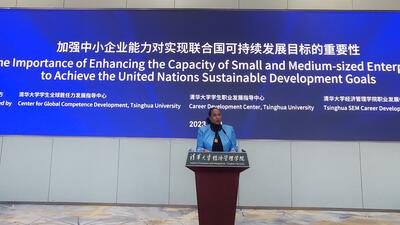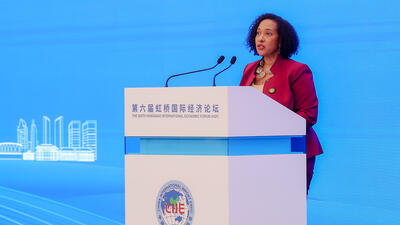

Digital connectivity is key to small business success
(Shanghai, China) Pamela Coke-Hamilton’s opening remarks at the sub-forum on “Exploring International Digital Governance and Creating Opportunities for Digital Industry” of the sixth Hongqiao International Economic Forum.
Distinguished guests, ladies and gentlemen, I am thrilled to be with you today. This is my first trip to China since I became Executive Director of the International Trade Centre, and what I’ve already seen and heard today has inspired me greatly about what the future holds. I look forward to future visits.
I’m especially glad that this first trip is for the China International Import Expo and the Hongqiao Forum, events where ITC has been fortunate to be an official partner for many years.
Today, I’d like to focus my remarks on what digital connectivity means for small businesses and highlight some things we’ve learned at ITC about what works well and what should change. I’d also like to note some developments in international digital governance that could have a major impact for these businesses and conclude with some points that I hope will be useful in your conversations.
ITC is the UN small business agency, meaning that our top priority is to help micro, small, and medium-sized enterprises, or MSMEs, engage in trade—and in turn, contribute to the global economy and to the achievement of the Sustainable Development Goals.
Every day, we’re seeing what digital connectivity means for MSMEs’ business and trading opportunities—and what it means when they’re unable to get online and make the most of new technologies.
That’s why ITC has an entire “moonshot” on digital connectivity, as we look to draw in partners that will invest in helping MSMEs get online and engage in e-commerce, while ensuring policymakers have the information they need to craft a supportive business environment.
This is an urgent issue, and it’s why I’m glad to see events like today’s look at international digital governance and what roles digital industry can play in propelling us into a better future.
At a time when the world is facing multiple, global crises, we’re seeing every day that those MSMEs that are digitally connected can weather external shocks better. They can adapt their business practices to sell their products and services online when needed, remain connected to international buyers, and access training and other resources. Those that aren’t connected, however, feel these shocks far more deeply.
But there are ways to help more MSMEs get online. As part of a working group under the UN Broadband Commission, we took a deep dive into the world of “digital enablers,” such as cloud-based services, online platforms, digital financial services, and MSME information portals. These enablers can transform MSMEs’ business practices. But ensuring that MSMEs can use these enablers effectively requires training and support, and it’s where digital industry partners can help.
And at a time when technologies like artificial intelligence and blockchain are changing the nature of how we live and work, we must also look at how these technologies can provide solutions to challenges that MSMEs regularly face outside the world of e-commerce—such as access to finance or better traceability in supply chains.
Many of the technologies we see emerging in China—with its booming digital economy—make us excited for what these could mean for MSMEs worldwide. Just last year, the value of China’s digital economy reached over 50 trillion yuan! And China is also playing a leading role in crafting an international policy environment that can enable greater digital connectivity and provide valuable clarity for businesses large and small.
For instance, China is one of 89 World Trade Organization members negotiating new rules on electronic commerce—a group accounting for over 90 percent of global trade. Once reached, this agreement could help resolve major questions involving cross-border data flows, single windows, electronic invoicing, and more.
This is important: today, we’re seeing a host of new initiatives at the national and regional levels to address the opportunities and risks that new technologies pose. As these efforts move forward, we must keep in mind the risk of fragmentation and confusion if we’re not careful with how we approach international digital governance, as those that will feel the impacts of this fragmentation the most are smaller businesses.
As you engage in today’s conversations, I hope you keep these points in mind: MSMEs play a critical role in the global economy, accounting for roughly 90 percent of businesses in any country and nearly two-thirds of jobs. Working with them as they make the most of what the digital economy has to offer will pay dividends far beyond what we can imagine, but they need the support of digital industry and the right international digital policy environment for this to work. I look forward to discussing these ideas with you further and wish you a successful Expo and Forum.
Thank you all.






